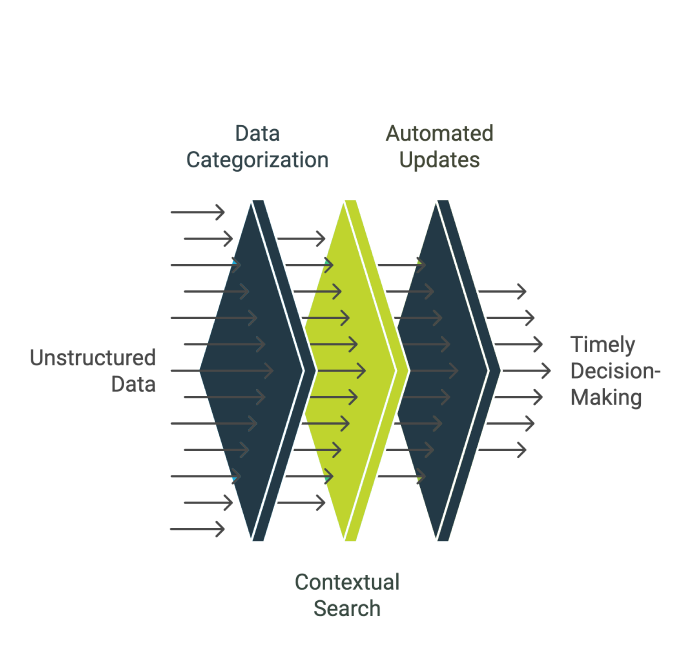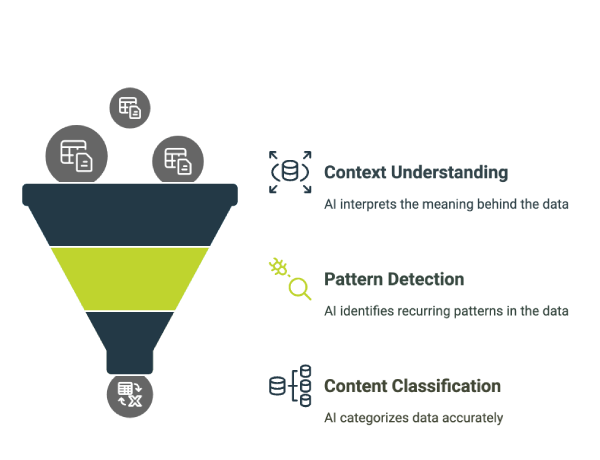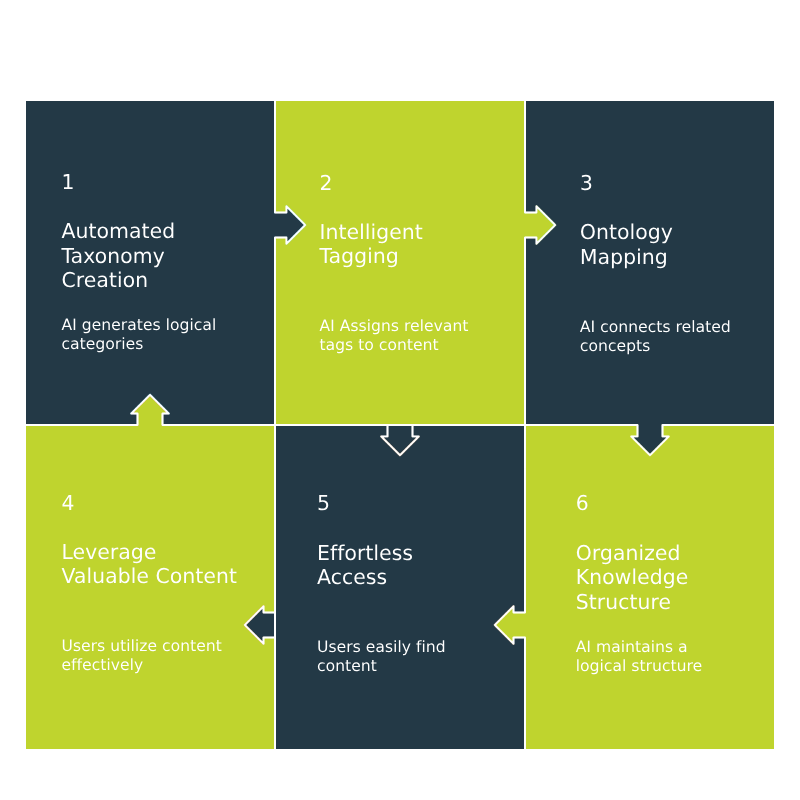Managing organizational knowledge has grown increasingly complex as companies face vast volumes of unstructured data from emails, chats, video transcripts, and scattered communications across multiple platforms. Traditional knowledge management, relying on static databases and manual processes, can no longer adequately handle this dynamic and diverse content.
Artificial intelligence provides the solution, automating tedious data management tasks and delivering smarter methods for capturing, organizing, and retrieving information rapidly.
Understanding The Basics Of AI-Based Knowledge Management
AI-based knowledge management leverages artificial intelligence techniques, including natural language processing (NLP), machine learning, and semantic analysis, to enhance how organizations create, categorize, and retrieve structured and unstructured information.
Traditional knowledge management systems struggled due to reliance on manual processes and rigid databases, limiting their ability to handle vast and varied data effectively. In contrast, AI introduces adaptable, self-improving ecosystems that automatically organize and update content, making it continuously relevant.
Intelligent tagging helps categorize information precisely, while contextual search enables users to quickly find relevant insights even without exact search terms. Automated updates keep the knowledge base current, significantly accelerating access to essential information for timely decision-making.
Core Components & Technologies
Artificial intelligence transforms knowledge management at every stage of the knowledge lifecycle, from initial data ingestion to final information delivery, creating systems that are faster, more intelligent, and scalable.
Data Collection & Aggregation
AI systems automate the collection and consolidation of information from various internal and external sources, including emails, databases, chat messages, documents, and video transcripts. Gathering this diverse, often unstructured data allows businesses to maintain an in-depth, up-to-date knowledge base without intensive manual effort.
Information Processing & Analysis
Through machine learning and NLP, AI-based tools understand context, detect meaningful patterns, and accurately classify content even if the data is inconsistently formatted. Automating this processing enhances accuracy and frees staff from repetitive, time-consuming tasks.
Search & Retrieval
Semantic search capabilities in AI-based systems significantly outperform traditional keyword searches. Leveraging user intent, synonyms, and natural language queries, these intelligent searches quickly retrieve highly relevant results, improving efficiency and user experience.
Knowledge Organization
Automated taxonomy creation, intelligent tagging, and ontology mapping driven by AI organize information logically. Maintaining an organized knowledge structure helps users effortlessly access and leverage valuable content.
The Real Value Of AI-Based Knowledge Management
Knowledge management driven by AI delivers substantial improvements in the speed, accuracy, and depth of insights organizations can access from their data.
Enhanced Decision-Making
Artificial intelligence surfaces patterns, highlights content gaps, and uncovers insights that help leadership teams make decisions backed by real-time, context-aware information. When information is easier to find, teams can act more decisively and with greater trust in the accuracy of their inputs.
Increased Operational Efficiency
Automating tagging, classification, content curation, and similar tasks significantly reduces the need for tedious manual labor. With AI handling repetitive tasks, teams can shift their attention to high-level planning, strategy, and analysis.
Improved Collaboration
AI systems help eliminate silos by enabling real-time access to shared knowledge across departments. Teams work from the same set of information, improving transparency and coordination throughout the organization.
Scalability & Adaptability
These models become more effective over time, learning from emerging patterns in user behavior and data trends. Continuous adaptation helps knowledge management systems remain relevant and effective as organizational needs shift and data volume grows.
Real-World Applications & Use Cases
Organizations in diverse sectors are increasingly turning to AI-based knowledge management systems to address significant operational challenges.
Enterprise Knowledge Bases
Companies are using AI to streamline how internal information is accessed and applied across departments. Intelligent search functions cut down time spent looking for documents, while automated tagging and categorization reduce duplicated efforts.
These systems also help improve customer support, giving service teams quicker access to accurate, up-to-date information that enhances response quality and consistency.
Research & Development
R&D teams benefit from AI’s ability to process vast datasets and identify connections that would be difficult to uncover manually.
Through actively surfacing patterns across disciplines and drawing from multiple sources, AI enhances literature reviews, accelerates hypothesis generation, and contributes to faster innovation cycles.
Customer Service & Support
AI-augmented systems support chatbots and virtual agents that can instantly retrieve answers from centralized knowledge bases, helping to speed up response times. It also improves user satisfaction by delivering more accurate and relevant information.
Service representatives also benefit from these tools, as they can focus on resolving complex issues instead of searching for basic answers.
Future Trends In AI-Based Knowledge Management
Artificial intelligence is still in the early stages of transforming knowledge management, and its impact is expected to grow significantly as complementary technologies continue to develop.
Advancements In AI & NLP
Future improvements in natural language processing and machine learning will allow AI systems to better understand context, predict user intent, and even generate relevant content.
These advancements will reduce the effort required to retrieve or produce useful information, streamlining how teams access insights and supporting more responsive knowledge systems.
Integration With Emerging Technologies
AI will increasingly intersect with technologies like the Internet of Things and edge computing to support real-time knowledge acquisition from physical systems and connected devices.
Blockchain technology may also play a role in enhancing transparency and trust by creating secure, decentralized knowledge records, particularly in environments where data integrity is essential.
The Evolving Role Of Human Expertise
While AI automates a growing number of tasks, human oversight remains essential. Subject matter experts are needed to train models accurately, validate AI outputs, and apply judgment in situations where context or ethics require nuanced decision-making.
The ongoing partnership between human expertise and artificial systems will influence how information is understood and deployed going forward.
Learn How Your Organization Can Best Utilize AI With Orases
AI has moved beyond theory in knowledge management and is now setting the pace for how information is organized and accessed. As data grows more complex and fast-moving, organizations that invest in AI-powered systems will be better positioned to respond with clarity, precision, and confidence.
At Orases, our team specializes in creating customized AI solutions that transform how organizations capture, organize, and leverage their information. We build intelligent, adaptive platforms designed to scale effortlessly, helping your team uncover deeper insights and make informed, strategic decisions faster.
To learn more about how Orases can support your business through AI innovation, connect with us online or call 301.756.5527 to schedule your consultation today.









